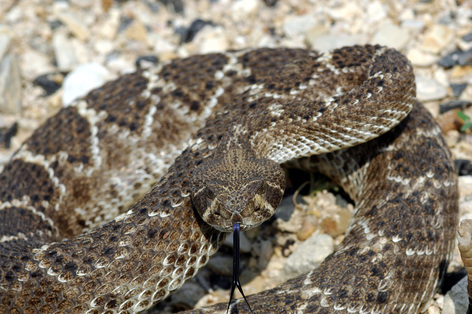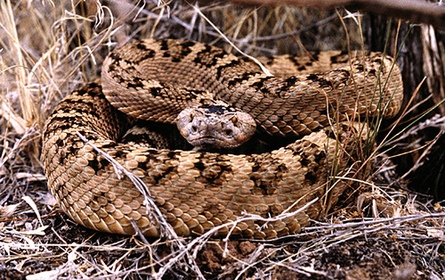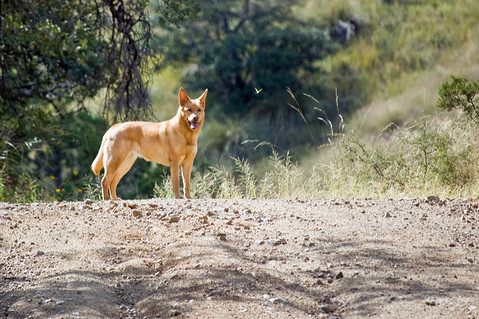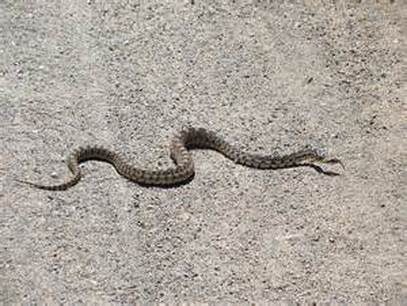|
GENERAL INFORMATION Every year in the US, approximately 300,000 dogs and cats are bitten by venomous snakes. These bites can cause serious illness, irrevocable damage, and death. Rattlesnakes live in a wide variety of habitats including but not limited to: deserts, wetlands, and forests from sea level to mountain elevations. Most of the time rattlesnakes are active in the warmer seasons between the spring and autumn. Dogs are more at risk if they accompany their owners on hikes, camping or hunting. Just like us they can stumble upon them on accident. If your dog does any of these activities, or you live closer to the mountains were the rattlesnakes may be in higher concentration, you should highly consider the rattlesnake vaccination. The rattlesnake vaccination was developed to protect against venom from the Western Diamondback Rattlesnakes and is most effective against this species. However, here in the United States, many snakes have very similar venom, thus the vaccine may help protect against venoms of other rattlesnake species as well. The varieties of snakes it may protect against include the Prairie, Great Basin, Northern and Southern Pacific, Sidewinders, Timber rattlesnakes, Massasauga and the Copperhead. It may also have partial protection against Eastern Diamondbacks but it will not protect against Water Moccasin/Cottonmouth, Mojave Rattlesnakes, or Coral Snakes. The vaccine works by inducing the dog or cats’ immune system to generate protective antibodies against the venom when they have been bit. There are some factors that can influence the effectiveness of these antibodies such as the snake species, the age of the snake, the amount of venom injected, the location of the bite, how well the dog responds to the vaccine, and the length of time since the last dose of vaccine was administered. According to the Red Rock Biologics* (the makers of this vaccine), there have been reports that the dogs who have these protective antibodies experience less swelling, less tissue damage and a faster recovery from a bite. When first getting the rattlesnake vaccine, your dog will get the initial vaccine and then in one month will need to receive a booster. After that initial year of vaccinating, they will just need 1 booster annually in the spring before the peak of rattlesnake season. We highly suggest coming in and starting in April through the beginning of June to get the best possible protection during the rattlesnake season. If you live in an area that has a high population of rattlesnakes, a high incidence of rattlesnake bites, or you frequently visit areas of the country with rattlesnakes, then you may consider boostering that vaccine twice a year. This is because the vaccine is most effective the 1st 6 months after administration and declines in effectiveness after that. CONTRAINDICATIONS If your dog is immunosuppressed, suffering from a severe chronic illness, or has a history of vaccine reactions, your veterinarian may not recommend this vaccine. FURTHER RECOMMENDATIONS When you are hiking in rattlesnake country, try to stick to hiking on open paths, keep your dogs on leashes to increase safety, and discourage them from digging (especially around logs and rocks). If your home is located in an area where rattlesnakes are very common, keep brush and firewood away from your home and keep grass mowed in the areas where dogs frequently spend time. RATTLESNAKE BITE TREATMENT Treatment for rattlesnake bites can be expensive. Treatment may include anti-venom injections that can cost hundreds to thousands of dollars. The use of the anti-venom is associated with an increased risk of adverse effects making recovery even more complicated. Other costs associated with rattlesnake bites include hospitalization, intravenous fluids, and other medications and potentially even surgery. By getting your dog this vaccine, you can reduce the impact of the bite, reduce or even eliminate the need for anti-venom and decrease other treatment costs. Just because a dog gets the vaccines does not mean that the dog does not need to be taken to the vet in the event of snakebite. If your dog does get a bite, take him/her to your nearest vet immediately. Even if it is a non-venomous snake, the wounds could result in infection. If a snakebite occurs during our business hours, please call and come directly into the clinic. If it is the weekend there should be an emergency vet located near your local area. If you are here in the Ogden area, the Animal ER is located in Sunset. It is in Sunset Square at 2465 N Main Street #5 next to Ace Billiards. Their phone number is 801-776-8118. They open at 6pm Monday through Friday and close at 8am. Saturday they open at 12pm (noon) until Monday at 8am. They are also open on holidays. If you have any other questions about the rattlesnake vaccination, please feel free to call our office at 801-782-4401. *This article was reviewed by a licensed veterinarian.
*Red Rocks Biologics is the manufacturer for the rattlesnake vaccine used here at NOAH. More information can be found at http://www.redrockbiologics.com/
5 Comments
6/5/2018 12:55:47 am
Very Informative and useful... Keep it up the great work
Reply
6/21/2018 12:24:59 am
Very Informative and useful... Keep it up the great work
Reply
4/2/2022 05:16:31 am
I real glad to uncover this web internet site on bing, just what I was searching for.
Reply
6/29/2022 06:02:12 am
This article is an engaging abundance of enlightening information that is intriguing and elegantly composed. I praise your diligent work on this and thank you for this data. You have what it takes to get consideration.
Reply
7/2/2022 06:00:33 am
You have done a great job. I will definitely dig it and personally recommend to my friends. I am confident they will be benefited from this site.
Reply
Leave a Reply. |
Author:NOAH Staff Archives
April 2022
|



